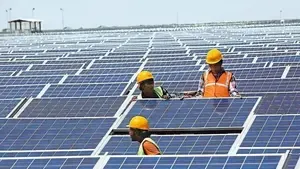Government Modifies Policy to Enhance Domestic Production of Solar PV Cells

New Delhi, Dec 10 (NationPress) The Ministry of New and Renewable Energy (MNRE) has declared a crucial modification to the Approved Models and Manufacturers of Solar Photovoltaic Modules (ALMM) Order, 2019, representing a vital stride towards enhancing domestic production and nurturing self-reliance in India’s green energy sector.
This modification unveils the long-anticipated List-II for solar PV cells within the ALMM framework and is scheduled to take effect on June 1, 2026. “Once this regulation is implemented, all solar PV modules utilized in projects – including government-supported schemes, net-metering projects, and open access renewable energy initiatives – will be obligated to source their solar cells from ALMM List-II. This will guarantee the quality and reliability of solar PV cells employed in India's energy infrastructure,” stated the Ministry of New and Renewable Energy (MNRE).
The introduction of List-II is a reaction to the nation’s swiftly expanding solar manufacturing capabilities. Previously, the lack of List-II was attributed to a restricted domestic supply of solar cells. However, with significant growth in India’s solar cell manufacturing capacity anticipated in the upcoming year, this amendment is set to alter the industry's landscape, according to the statement.
This change has been sanctioned by Minister for New and Renewable Energy Pralhad Joshi, highlighting the government’s dedication to advancing India’s renewable energy objectives and ensuring a greener, more sustainable future for all, as stated.
For projects that have already been tendered but whose final date for bid submission occurs before this order is issued, an exemption will apply, allowing them to proceed without the necessity to utilize solar PV cells from List-II, even if their commissioning date is after June 1, 2026. Nevertheless, for all future bids, the requirement to source both solar PV modules and cells from the relevant ALMM lists will be obligatory, representing a significant shift towards quality assurance and sustainability in India’s solar power industry, as explained in the statement.
“This policy enhancement is expected to yield substantial economic and environmental advantages. By mandating the utilization of solar PV cells which will be incorporated in the ALMM List-II after undergoing a rigorous procedure to verify their quality and reliability, the government aims to cultivate a robust domestic solar PV supply chain, minimize the carbon footprint linked to solar module imports, and strengthen India’s energy security. This initiative aligns with India’s broader objective of achieving 500 GW of non-fossil fuel-based power capacity by 2030 and making significant progress in its commitment to clean energy,” the statement indicated.
The amendment will not only fortify India’s status as a global leader in renewable energy but will also expedite the growth of India’s solar manufacturing sector. The projected increase in demand for solar PV cells in India is expected to trigger innovation, create new job prospects, and attract investments in advanced manufacturing. It will also enhance the overall quality and reliability of solar products utilized in India, ensuring that projects adhere to the highest standards, as the statement pointed out.
The government has also acknowledged the significance of thin-film solar technology in India’s renewable energy trajectory. Under the new amendments, thin-film solar modules produced in integrated solar PV module manufacturing units will be regarded as compliant with the requirement to utilize solar PV cells from List-II, further promoting technological innovation and diversification within the sector, the statement noted.
In the forthcoming months, the MNRE will release comprehensive procedural guidelines for the enlistment of solar PV cells under ALMM List-II, providing explicit instructions for manufacturers and project developers on how to adapt to the revised requirements.
By prioritizing solar PV cell production and diminishing reliance on imports, this amendment establishes a solid groundwork for India’s clean energy future. It supports the expansion of the solar power sector, generates economic opportunities, and significantly contributes to the nation’s climate objectives. With this initiative, India is poised to enhance its energy independence, advocate for sustainable development, and emerge as a global center for solar energy innovation, the statement concluded.










